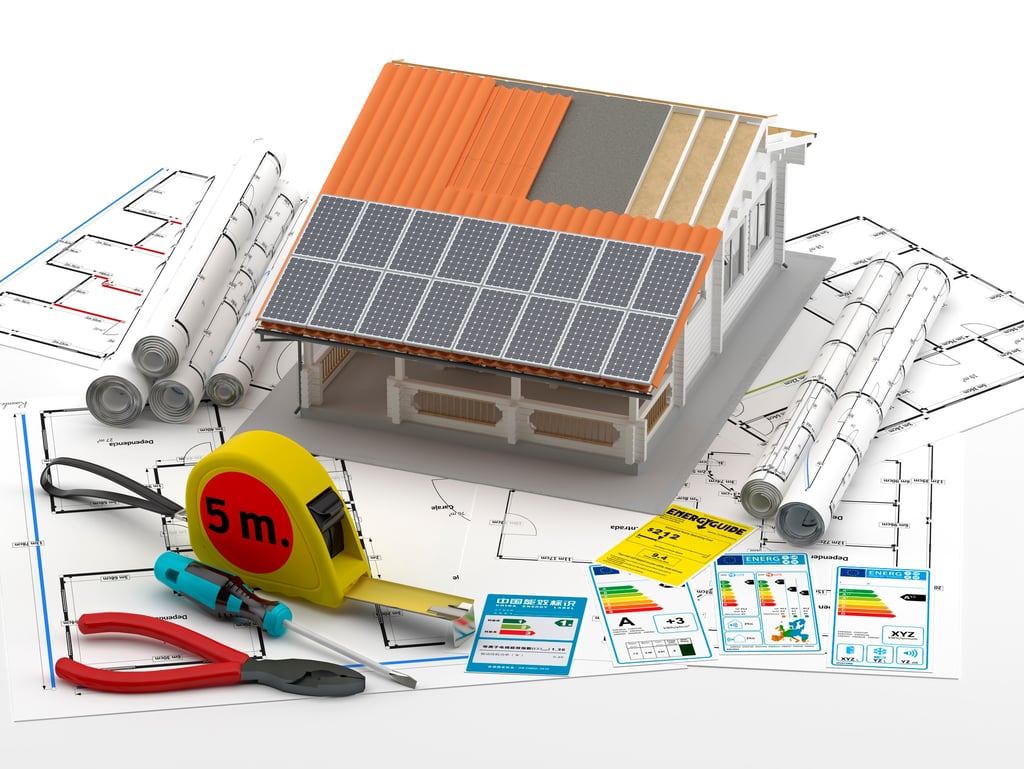
With the growing popularity of solar energy for use at home, a number of Kiwi homeowners are wondering if they can use solar alone to power their daily lives.
Relying completely on energy generated by solar panels — with no utility grid connection — is more possible now than ever before, thanks to the increased availability and falling prices of solar panels and batteries. But while being completely ‘grid-independent’ can be an attractive idea, it does come along with some budgeting considerations and lifestyle adjustments.
Is going off-grid right for you? It’s not an easy ‘yes’ or ‘no’, as every homeowner is different. Here, we’ll share 9 questions to consider before you quit the grid. (These points were originally covered in a [piece by Australia’s Ergon Energy], the Queensland energy corporation. We think the info applies very well to NZ homeowners, too!)
1. How much roof ‘real estate’ is available to your solar panels?
In urban environments, or with smaller houses, you can only fit so many solar panels on your roof. In situations with limited roof space (and perhaps little yard space for ground mounted solar additions), being off the grid means budgeting for a higher-capacity system and battery, drastically limiting your power usage, or both.
2. Are the upfront costs worth it?
With more panels and storage solutions, off-grid solar systems can range anywhere from $12,000 for batches and tiny homes, with minimal power use, right up to $60,000+ for family homes with high energy use. There are energy-storage benefits to staying on the grid. With a common net-metered solar installation, you can begin to see savings fairly quickly — at night for example, you can use stored energy at home, and the excess power you don’t use can be sold back to your utility company. To see how much you can actually save with grid-connected solar energy, we invite you to look at our World Solar Calculator.
But off-grid, the stored energy can quickly run out, and you can’t ‘sell’ or get credits for any excess. So, unless you’re installing the system on a brand new home, it can take a fairly long time to see big savings that offset your initial costs.
3. Are you ready for ongoing maintenance costs?
While the warranty period may vary from supplier to supplier, your solar panels themselves often come with a 25-year warranty, your battery and inverter may have to be replaced after 5-10 years. Generators come with their own costs as well, as you’ll have to pay out-of-pocket for fuel.
4. Can you avoid sudden power usage spikes?
When off the grid, running power-hungry machines simultaneously — for example, your clothes washer, fridge, and stove — will quickly deplete your energy stores. To ensure you don’t run out of power, you’ll have to consciously avoid running big devices together, or else invest in a higher-capacity system and battery.
5. What will you do when power is unavailable?
Sometimes, your power might go out. Your system will need periodic maintenance, the system could possibly break down and require emergency repairs, or you could simply run out of power due to heavy usage at night or during overcast days. For these reasons it’s important to have a backup, such as a generator.
6. Are you ready to live the off-grid lifestyle?
Keeping a closer eye on your power consumption means living differently at home. Consider how often you host guests at home, for example, at a party or family gathering. Will your guests understand having a little less music or TV for entertainment, or fewer indoor lights?
Also, you’ll find yourself using power reserves sparingly during the hot summer months (when the AC might be needed) or over several-day stretches of low sunlight. Being comfortable with that, and prepared, is essential.
7. What will you do for emergency maintenance needs?
If the power goes out, there would be no utility company to rely on for an automatic fix — you would have the responsibility for calling in emergency repair services. Being prepared for downtime means being fully informed on who to call to service your warranty claims, and how quickly you can expect repairs to be made.
8. How will your property value be affected by an off-grid installation?
Not all home buyers are willing to make the jump just yet. Grid-connected solar panel systems are often valued for the chance of a fairly-quick solar payback, but relatively few buyers are ready for the responsibilities and lifestyle adjustments of an off-grid setup. This could affect your home’s list price.
9. If you’re thinking of buying an electric vehicle, are you ready for the extra costs?
Some solar energy consumers are interested in eventually buying an electric car, but the extra costs can add up very quickly. To power an EV, you’ll need an extra battery and a higher-capacity system overall, especially if you hope to take advantage of ‘fast charging’ technology.
We enjoy educating our readers on the wonderful world of solar power, and we want to give you all the facts on the off-grid lifestyle, so you can make the right decision for your home and family.
If you’d like to continue your off-grid education, please get in touch for a free, no-obligation chat with one of World Solar’s consultants.








